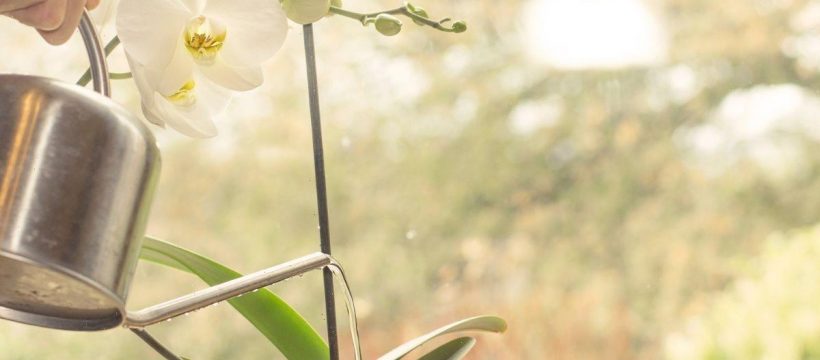Orchids: Expert shares tips for looking after plant
We use your sign-up to provide content in ways you’ve consented to and to improve our understanding of you. This may include adverts from us and 3rd parties based on our understanding. You can unsubscribe at any time. More info
Knowing how to water orchids properly is essential to keep these houseplants alive. If you’ve just bought one of your own and want to know whether ice cubes are a safe option, or if you’ve grown them for a while and want to find a simpler to keep yours in good health and looking beautiful, Kate Lindley, a houseplant expert at Baby Bio has shared advice on this orchid ice cube watering hack.
One of the biggest problems in orchid care is either over-watering or under-watering. Finding that perfect balance is one of the most difficult for beginner orchid growers to master.
The plant pro noted that using ice cubes is the “worst way” to water orchids as it’ll “prevent healthy growth”.
She said: “Some houseplant enthusiasts may be tempted to try watering with ice cubes, as it is thought that the slow drip of water from the melting ice cube mimics that of water dripping from the leaves in tropical climates where orchids natively grow.
“But the cold temperature from the ice cubes can cause the root system to go into shock, which in turn will prevent healthy growth.

“That’s because most orchid varieties are native to areas in southeast Asia, and are therefore acclimatised to warm, tropical rains.”
Amanda Matthews, Orchid expert at Orchideria, agreed that these houseplants should not be watered with ice due to the huge temperature difference.
She said: “The temperature inside the potting medium is my biggest argument against using the ice cube method.”
The plant guru warned that by the time the ice cube melts the temperature of the water is still “incredibly cold” that the “roots would take a hit”.
DON’T MISS
‘Fastest’ solution to remove silicone sealant mould around windows [TIPS]
‘Ideal temperature’ to avoid condensation, damp and mould in your home [EXPERT]
Inside Queen Camilla’s £850,000 home which King Charles ‘loathes’ [INSIGHT]
In a study on the ice cube watering method for orchids, it found that by the time ice cubes melted and by the time the water would interact with the roots, it was 13 degrees. Only five hours later would the temperature increase to room temperature.
As well as the cold temperatures that come with watering orchids with ice cubes, using this method on the potting media will not keep it moistened enough.
Plant experts at Ohio Tropics said: “By giving your orchid three ice cubes, as is often the advice, it will slowly melt and penetrate the mix. But it really doesn’t provide much water.
“The problem is that over time, if you leave that orchid there, it will decline and die. Orchid roots need air, but they also need to be thoroughly moistened.”

“If you see any orchids that are being grown in bark, three ice cubes will be even less successful in moistening all of the bark in the pot. It just makes no sense.”
Rather than using the ice cube method, Kate recommended soaking the houseplant in tepid water.
She explained: “Instead, it is best to fill the outer container with tepid water so that the whole compost in the pot is covered.
“Leave to stand in the water for one hour, then drain off the water. Leave to drain for another hour to avoid it sitting in water, as orchids are susceptible to root rot.

“Put the water to one side, as this can be used to water your other houseplants! Once your orchid has completely drained off, replace the inner pot into the outer decorative pot.”
In fact, for owners who have a severely dehydrated plant with shrivelled roots, they can use this method to soak their plant even overnight and do this at least weekly until it starts to revive.
Gardeners can also just take their orchid to the sink and stream Lukewarm water through the pot so that the potting medium is thoroughly soaked.
After, simply allow the water to drain away through the drainage holes. This method is great if the houseplant is in good condition and not terribly dehydrated.
Source: Read Full Article
